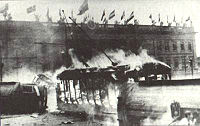- Colombian Liberal Party
-
Colombian Liberal Party
Partido Liberal Colombiano
Leader Rafael Pardo Rueda Founded 1848 Headquarters Bogotá, Colombia Ideology Social democracy,
Liberalism,
Social liberalismPolitical position Center-left International affiliation Socialist International Official colours Red Seats in the Chamber of Representatives 37 / 166Seats in the Senate 17 / 102Website http://www.partidoliberal.org.co/ Politics of Colombia
Political parties
ElectionsLa Violencia 
Prelude Murder of Jorge Eliécer Gaitán El Bogotazo Political Parties Liberal Party Conservative Party Colombian Communist Party Presidents of Colombia Mariano Ospina Pérez Laureano Gómez Gustavo Rojas Pinilla The Colombian Liberal Party (Spanish: Partido Liberal Colombiano; PLC) is a center-left party in Colombia that adheres to social democracy and social liberalism.
The Party was founded in 1848 and, together with the Colombian Conservative Party, subsequently became one of the two main political forces in the country for over a century.
After the period known as La Violencia the Liberals and the Conservative Party reached an agreement to share power from 1958 to 1974 in the so-called National Front agreement that followed the fall of General Gustavo Rojas Pinilla. Nowadays there are many critics of the 16 year agreement but it has to be admitted that it greatly reduced the intensity of the violent political warfare that preceded it.
In the year 2002, the Liberal Party was the largest single party in the Colombian Congress, with 54 out of 166 deputies, and 28 of 102 senators. In the election of 2006, the party won 38 out of 166 Deputies and 18 out of 102 senators.
With the election of independent President of Colombia, Álvaro Uribe Vélez as president the Liberal party reached its greatest crisis ever. Alvaro Uribe is indeed a former member of the party, having crafted all of his political career prior to his election (where he ran as an independent Liberal) inside it, and has the strong backing of a substantial majority of the former Liberal elected congressmen (classified as "Uribist" Liberals by the media).
The party's crisis has many reasons different from President Uribe's election and subsequent re-election, but the evident divide among the leadership has greatly diminished the support to the Colombian party, which was previously the most popular in the country. Most of the current "Officialist" (as named by the Colombian press) leadership of the Liberal Party is openly opposed to Uribe's government and his policies. In an effort to maintain some unity the party's selected in June 2005 former president César Gaviria Trujillo as their current chief.
These two factions, according to some observers,[who?] may be considered as a renewal of the old "split" between "neoliberal" and more "social" minded Liberal politicians, though the formula is not without its exceptions.[citation needed] This said it must be mentioned that both factions have not escaped corruption scandal in recent years.[citation needed]
During the presidential elections of 28 May 2006, the official liberal candidate Horacio Serpa Uribe won 11.84 % of the popular vote, placing him third.
During the parliamentary elections of 14 March 2010, the Liberal Party obtained 18 senators and 35 representatives.
The Liberal Party is a member of Socialist International.
See also
- Contributions to liberal theory
- Liberal democracy
- Liberalism
- Liberalism in Colombia
- Liberalism worldwide
- List of liberal parties
- Social democracy
- Social liberalism
External links
- Official web site
- Democracia a distancia: Elecciones 2006 (Portalcol.com) (Information about the party's list of candidates to the Colombian Senate, Spanish).
Categories:- Liberal parties
- Political parties in Colombia
- Socialist International
- La Violencia
- Political parties established in 1848
Wikimedia Foundation. 2010.
